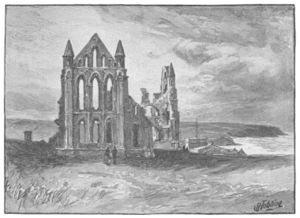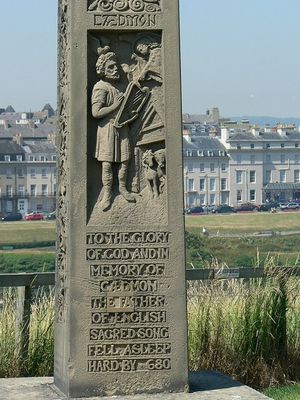كيدمون
كيدمون إنگليزية: Cædmon، /[invalid input: 'icon']ˈkædmən/ أو /ˈkædmɒn/) هو أقدم شاعر إنگليزي (وهو من نورثمبريا) واسمه ذائع الصيت. وهو أنگلو-ساكسوني اهتم بالحيوان الأعجم وكان مرتبطاً بالدير المزدوج في Streonæshalch (أبرشية ويتبي) أثناء ترؤس الدير (657–680) من قِبل القديسة هيلدا (614-680)، وكان في بادئ الأمر جاهلاً بـ"فن الأغاني" إلا أنه تعلم التأليف ذات ليلة في المنام، حسب راهب القرن الثامن، بيد. ولاحقاً أصبح راهباً متعصباً و شاعراً مسيحياً مفوهاً وملهـِماً.
كيدمون هو أحد الشعراء الأنگلو-ساكسون الإثني عشر المذكورين في المصادر القروسطية، وأحد ثلاثة فقط وصلتنا معلومات معاصرة لهم عن سيرتهم وكذلك أمثلة من انتاجهم الأدبي.[1] قصته مروية في Historia ecclesiastica gentis Anglorum ("التاريخ الكنسي للشعب الإنگليزي") عن بيد الذي كتب، "كان في دير هذه الأبرشية أخٌ معين متميز برحمة من الرب، who was wont to make religious verses, so that whatever was interpreted to him out of scripture, he soon after put the same into poetical expressions of much sweetness and humility in بالإنگليزية, which was his native language. By his verse the minds of many were often excited to despise the world, and to aspire to heaven."


العمل الوحيد المتبقي من كيدمون هو نشيد كيدمون Cædmon's Hymn, the nine-line alliterative vernacular praise poem in honour of God which he supposedly learned to sing in his initial dream. القصيدة هي أح دأقدم الأمثلة المؤكدة من الإنگليزية القديمة وهي، بنقوش الرونية على كل من صليب روثويل وFranks Casket، هي أحد ثلاث أمثلة تتنافس على لقب أقدم مثال مؤكد للشعر الإنگليزي القديم. وهي أيضاً أحد أقدم الأمثلة المسجلة لشعر باقٍ في لغة جرمانية.
الهامش
- ^ الشعراء الأنگلو-ساكسون الإثنا عشر المسمَّون هم: Æduwen, Aldhelm, Alfred the Great, أنلاف Anlaf, Baldulf, Bede، كيدمون، Cnut, Cynewulf, Dunstan, Hereward، ووولفستان Wulfstan (أو ربما Wulfsige). ومعظمهم يعتبره العلماء الحديثون to be spurious—see O'Donnell 2005, Introduction 1.22. The three for whom biographical information and documented texts survive are Alfred, Bede, and Cædmon. كيدمون هو الشاعر الأنگلو-ساكسوني المعروف أساسً لقدرته على تأليف vernacular verse, and no vernacular verse survives that is known to have been written by either Bede or Alfred. There are a number of verse texts known to have been composed by Cynewulf, but we know nothing of his biography. (No study appears to exist of the "named" Anglo-Saxon poets—the list here has been compiled from Frank 1993 (http://www.arts.manchester.ac.uk/mancass/thetollerlecture/: Roberta Frank), Opland 1980, Sisam 1953 and Robinson 1990).
المراجع
- Andersson, Th. M. 1974. "The Cædmon fiction in the Heliand Preface" Publications of the Modern Language Association 89:278-84.
- Ball, C. J. E. 1985. "Homonymy and polysemy in Old English: a problem for lexicographers." In: Problems of Old English Lexicography: studies in memory of Angus Cameron, ed. A. Bammesberger. (Eichstätter Beiträge, 15.) 39-46. Regensburg: Pustet.
- Bessinger, J. B., Jr. 1974. "Homage to Cædmon and others: a Beowulfian praise song." In: Old English Studies in Honour of John C. Pope. Ed. Robert B. Burlin, Edward B. Irving, Jr. & Marie Borroff. 91-106. Toronto: University of Toronto Press.
- Colgrave, B. and Mynors, R. A. B., eds. 1969. Bede's Ecclesiastical History of the English People. Oxford: Clarendon Press.
- Day, V. 1975. "The influence of the catechetical narratio on Old English and some other medieval literature" Anglo-Saxon England; 3: 51-61.
- Dobbie, E. v. K. 1937. "The manuscripts of Cædmon's Hymn and Bede's Death Song with a critical text of the Epistola Cuthberti de obitu Bedae. (Columbia University Studies in English and Comparative Literature; 128.) New York: Columbia University Press.
- Dumville, D. 1981. "'Beowulf' and the Celtic world: the uses of evidence". Traditio; 37: 109-160.
- Frank, Roberta. 1993. "The search for the Anglo-Saxon oral poet" [T. Northcote Toller memorial lecture; 9 March 1992]. Bulletin of the John Rylands University Library; 75 (no. 1): 11–36.
- Fritz, D. W. 1969. "Cædmon: a traditional Christian poet". Mediaevalia 31: 334-337.
- Fry, D. K. 1975. "Cædmon as formulaic poet". Oral Literature: seven essays. Ed. J. J. Duggan. 41-61. Edinburgh: Scottish Academic Press.
- Fry, D. K. 1979. "Old English formulaic statistics". In Geardagum; 3: 1-6.
- Gollancz, I., ed. 1927. The Cædmon manuscript of Anglo-Saxon biblical poetry: Junius XI in the Bodleian Library. London: Oxford U. P. for the British Academy. (Facsimile of the MS.)
- Green, D. H. 1965. The Carolingian Lord: semantic studies on four Old High German words: Balder, Frô, Truhtin, Hêrro. Cambridge: Cambridge University Press.
- Hieatt, C. B. 1985. "Cædmon in context: transforming the formula". Journal of English and Germanic Philology; 84: 485-497.
- Howlett, D. R. 1974. "The theology of Cædmon's Hymn". Leeds Studies in English 7: 1-12.
- Humphreys, K. W. & Ross, A. S. C. 1975. "Further manuscripts of Bede's 'Historia ecclesiastica', of the 'Epistola Cuthberti de obitu Bedae', and further Anglo-Saxon texts of 'Cædmon's Hymn' and 'Bede's Death Song'". Notes and Queries; 220: 50-55.
- Ireland, C. A. 1986. "The Celtic Background to the Story of Cædmon and his Hymn". Unpublished Ph.D. diss. University of California at Los Angeles.
- Jackson, K. 1953. Language and History in Early Britain. Edinburgh: Edinburgh University Press.
- Klaeber, F. 1912. "Die christlichen Elemente im Beowulf". Anglia; 35: 111-136.
- Lester, G. A. 1974. "The Cædmon story and its analogues". Neophilologus; 58: 225-237.
- Miletich, J. S. 1983. "Old English 'formulaic' studies and Cædmon's Hymn in a comparative context". Festschrift für Nikola R. Pribić. Ed. Josip Matešić and Erwin Wedel. (Selecta Slavica; 9.) 183-194. Neuried: Hieronymus. ISBN 3-88893-021-9
- Mitchell, B. 1985. "Cædmon's Hymn line 1: What is the subject of scylun or its variants?" Leeds Studies in English; 16: 190-197.
- Morland, L. 1992. "Cædmon and the Germanic tradition". De Gustibus: essays for Alain Renoir. Ed. John Miles Foley, J. Chris Womack, & Whitney A. Womack. (Garland Reference Library of the Humanities; 1482.) 324–358. New York: Garland.
- O'Donnell, D. P. 1996. "A Northumbrian version of 'Cædmon's Hymn' (Northumbrian eordu recension) in Brussels, Bibliothèque Royale MS 8245–57, ff. 62r2-v1: identification, edition, and filiation." In: Beda Venerabilis: Historian, monk, and Northumbrian. Ed. L. A. J. R. Houwen and A. A. MacDonald. (Mediaevalia Groningana; 19.) 139–165. Groningen: Forsten.
- O'Donnell, D. P. 2005. Cædmon’s Hymn, a multimedia study, edition, and witness archive. (SEENET A; 7.) Cambridge: D. S. Brewer.
- O'Hare, C. 1992. "The story of Cædmon: Bede's account of the first English poet". American Benedictine Review; 43: 345–57.
- O'Keeffe, K. O’B. 1990. Visible song: transitional literacy in Old English verse. (Cambridge Studies in Anglo-Saxon England; 4.) Cambridge: Cambridge University Press, 1990.
- Opland, J. 1980. Anglo-Saxon oral poetry: a study of the traditions. New Haven: Yale University Press.
- Orton, P. 1998. "The transmission of the West-Saxon versions of Cædmon's Hymn: a reappraisal". Studia Neophilologica; 70: 153–164.
- Palgrave, F. 1832. "Observations on the history of Cædmon". Archaeologia; 24: 341–342.
- Plummer, C., ed. 1896. Venerabilis Baedae Historiam ecclesiasticam gentis anglorum, historiam abbatum, epistolam ad Ecgberctum una cum historia abbatum commentario tam critico quam historico instruxit Carolus Plummer ad fidem codicum manuscriptorum denuo recognovit. Oxford: Clarendon Press.
- Pound, L. 1929. "Cædmon's dream song". Studies in English Philology: A miscellany in honor of Frederick Klaeber. Ed. Kemp Malone and Martin B. Ruud. 232–239. Minneapolis: University of Minnesota Press.
- Princi Braccini, G. 1988. L'Inno di Caedmon e la sua leggenda. Una bibliografia annotata. (Quaderni dell'Istituto di Linguistica dell'Università di Urbino; 5) Urbino: I-XII, 1-151.
- Princi Braccini, G. 1989. "Creazione dell'uomo o destino dell'uomo? Due ipotesi per firum foldan (Inno di Caedmon v. 9)". Studi Medievali, s. 3, XXX: 65-142.
- Robinson, F. C. 1990. "Old English poetry: the question of authorship". ANQ; n.s. 3: 59–64.
- Schwab, U. 1972. Cædmon. (Testi e Studi: Pubblicazioni dell'Istituto di Lingue e Letterature Germaniche, Università di Messina.) Messina: Peloritana Editrice.
- Sisam, K. 1953. Studies in the History of Old English literature. Oxford: Clarendon Press.
- Smith, A. H., ed. 1978. Three Northumbrian Poems: Cædmon's Hymn, Bede's Death Song and the Leiden Riddle. With a bibliography compiled by M. J. Swanton. Revised edition. (Exeter Medieval English Texts and Studies.) Exeter: University of Exeter Press.
- Stanley, E. 1998. "St. Cædmon". Notes and Queries; 143: 4–5.
- Whitelock, D. 1963. "The Old English Bede". (Sir Israel Gollancz Memorial Lecture, 1962.) Proceedings of the British Academy; 48: 57–93.
- Wrenn, C. L. "The poetry of Cædmon". (Sir Israel Gollancz Memorial Lecture, 1945.) Proceedings of the British Academy; 32: 277–295.
وصلات خارجية
- Articles containing إنگليزية-language text
- Pages using Lang-xx templates
- Ill-formatted IPAc-en transclusions
- Pages using authority control with unknown parameters
- قديسون مسيحيون من القرن السابع
- 7th-century deaths
- Anglo-Saxon poets
- شعراء إنگليز
- History of North Yorkshire
- Northumbrian saints
- People from Whitby
- Yorkshire saints
- سنة الميلاد غير معروفة

